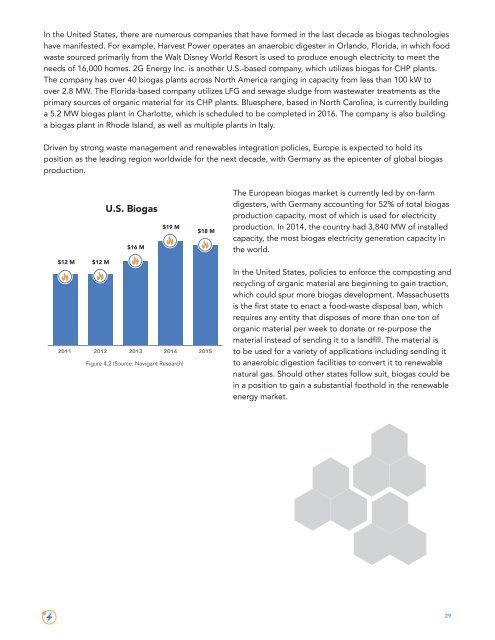AEN-2016-Market-Report
Create successful ePaper yourself
Turn your PDF publications into a flip-book with our unique Google optimized e-Paper software.
In the United States, there are numerous companies that have formed in the last decade as biogas technologies<br />
have manifested. For example, Harvest Power operates an anaerobic digester in Orlando, Florida, in which food<br />
waste sourced primarily from the Walt Disney World Resort is used to produce enough electricity to meet the<br />
needs of 16,000 homes. 2G Energy Inc. is another U.S.-based company, which utilizes biogas for CHP plants.<br />
The company has over 40 biogas plants across North America ranging in capacity from less than 100 kW to<br />
over 2.8 MW. The Florida-based company utilizes LFG and sewage sludge from wastewater treatments as the<br />
primary sources of organic material for its CHP plants. Bluesphere, based in North Carolina, is currently building<br />
a 5.2 MW biogas plant in Charlotte, which is scheduled to be completed in <strong>2016</strong>. The company is also building<br />
a biogas plant in Rhode Island, as well as multiple plants in Italy.<br />
Driven by strong waste management and renewables integration policies, Europe is expected to hold its<br />
position as the leading region worldwide for the next decade, with Germany as the epicenter of global biogas<br />
production.<br />
U.S. U.S. Biogas<br />
$16 M<br />
$19 M<br />
$18 M<br />
The European biogas market is currently led by on-farm<br />
digesters, with Germany accounting for 52% of total biogas<br />
production capacity, most of which is used for electricity<br />
production. In 2014, the country had 3,840 MW of installed<br />
capacity, the most biogas electricity generation capacity in<br />
the world.<br />
$12 M $12 M<br />
2011 2012 2013 2014 2015<br />
Figure 4.2 (Source: Navigant Research)<br />
*Revenue shown only for product categories with revenue data for all years 2011 - 2015<br />
In the United States, policies to enforce the composting and<br />
recycling of organic material are beginning to gain traction,<br />
which could spur more biogas development. Massachusetts<br />
is the first state to enact a food-waste disposal ban, which<br />
requires any entity that disposes of more than one ton of<br />
organic material per week to donate or re-purpose the<br />
material instead of sending it to a landfill. The material is<br />
to be used for a variety of applications including sending it<br />
to anaerobic digestion facilities to convert it to renewable<br />
natural gas. Should other states follow suit, biogas could be<br />
in a position to gain a substantial foothold in the renewable<br />
energy market.<br />
29


